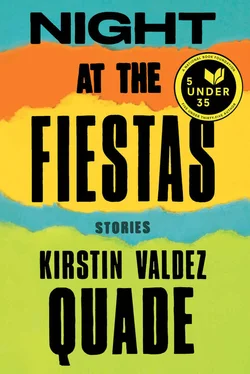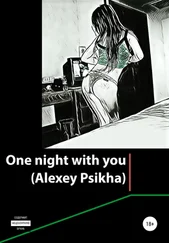Amadeo looks at her, surprised, then back at the TV. “Why you gotta tell me that?”
Angel faces him enthusiastically, grinning around her big white teeth, one foot tucked under her belly. “Weird, huh, that there’s a dick floating around in me? Do you ever think about that? How Gramma is the first girl you had your dick in?”
“The fuck. That’s disgusting.” Amadeo is horrified; this is his daughter .
“Jesus, too,” she says, singsong. “Jesus had his stuff in Mary.” She laughs. “Couple of virgins. There’s something for your research.” She settles back into the couch, pleased.
Angel has seemed only mildly interested in Passion Week, which is a relief to Amadeo, and an irritation. “So it’s like a play?” she asks.
“It’s not a play — it’s real. More real…” He doesn’t know how to explain it to her. More real even than taking Communion, Tío Tíve had said months ago when he sat with Amadeo at the Lotaburger and offered him the part. Tío Tíve looked at him severely. “You got a chance to thank Jesus, to hurt with Him just a little.”
Angel asks, “They’re going to whip you and stuff? Like, actually hard?”
He’s proud, can’t keep the smile from creeping in. “Yeah.”
“My friend Lisette cuts, but she just does it for attention.”
“It’s not like that. It’s like a way to pray.”
Angel whistles low. “Crazy.” She seems to be thinking about this, turns a pink crocheted cushion slowly in her hands.
Amadeo waits, exposed.
“So it’s gonna hurt.”
He tries to formulate the words to explain to Angel that the point is to hurt, to see what Christ went through for us, but he’s tongue-tied and shy about saying these things, as shy as he’d be if he were explaining it to his old friends. And he isn’t even sure he’s got it right. But here it is: his chance to prove to them all — and God, too — everything he’s capable of. “But it’s a secret, right? You can’t go tell nobody back in Española.”
“Why?”
“The Church don’t agree. You just can’t say anything.”
“Can I see it? The morada?”
He’d like her to see it, to see what he’s at the center of. “Tío Tíve don’t let women in there. You can go to Mass at the church. You can be in the procession.”
Angel scrunches her face. “Can’t I just see it? Once? You’re Jesus , aren’t you?”
“Tío Tíve would kill me.”
She’s good-natured in her pleading, all smiles. “Come on .”
“Women can’t go in. And besides…” Before he can stop himself, he glances down at her belly. Her face slackens and she turns back to the TV. When Amadeo looks again, she’s crying soundlessly, her face blotchy and ugly, mascara running down her cheeks.
It’s not his fault. He didn’t tell her to be a girl. He didn’t tell her to get knocked up. They were doing so well, she was showing some interest, he was feeling so good. “It’s just a building. It’s mostly empty, anyway.”
But now Angel’s shoulders rock. She has her fist pressed over her mouth, and she’s still not making a sound.
“Hey. Hey, don’t cry.” He turns awkwardly on the couch, pats the shoulder near him.
When she speaks, it’s with a gasp. “You think I’m too dirty for your morada. Is that it? Too dirty for your morada, too dirty for prom, too dirty for everything.”
An image flashes: Angel naked, sweaty and grunting with some boy. “You’re not dirty,” he says.
Guilt thick as tar bubbles in his gut, and suddenly he’s nineteen again and it’s summer, and he’s with Marissa in her parents’ backyard. They stretch out by the kiddie pool, beers warming in their hands and in the sun, while Angel slaps the water. Amadeo holds a plastic dinosaur, and he’s making it dance on the surface of the water, while Angel, with her damp black curls and lashes, slick red smile and swollen diaper, laughs her throaty laugh. They’re talking about Marissa’s older sister’s new trailer — two bedrooms, full bath, cream carpet — and Marissa says she wouldn’t mind a trailer, they could get a trailer, used at first, and beside them Angel splashes, a blade of grass stuck to her chest. Amadeo says, “You won’t catch me living in no trailer. Besides, they just lose value,” and Marissa says, stubbing out her cigarette emphatically in the grass, “It’s not that I wouldn’t rather have a house, but when? And we gotta be saving if we ever want to have a place of our own — are you even saving anything ?” This is when the fight starts, escalates. Amadeo accuses Marissa of getting pregnant just so he’ll have to take care of her, and he calls her dirty, dirty whore . (She isn’t, he knows that, hasn’t done any more than he has, but ever since she slept with him he can’t look at her the same way.) Then they’re both on their feet, and he slaps her, hard across the upper arm, which is bare and exposed in her sleeveless shirt. Marissa staggers back, reaches behind her into air to steady herself, finds no hold, falls.
Amadeo looks at his hitting hand, horrified. But if he were honest he might admit that even as he moved to hit her he knew he could stop himself and knew he was going to do it regardless. The real surprise is the shock on her face, proof that he can act on the world.
Marissa stands. The skin on her arm turns white then red where his palm made contact.
“You asshole! Don’t you ever hit me again.” She screams at him, throwing plastic buckets and toys. Some strike him, some miss and fall to the grass. Amadeo wishes she’d kill him. But she keeps yelling, “Don’t you ever hit me again!”
And it is that word, again , that terrifies him, as if by uttering it she opens up the possibility that he has it in him to do this again — even, somehow, makes it inevitable. From the kiddie pool, Angel looks up at her parents, eyes wide and black and unwavering.
“Don’t you walk away!” Marissa yells, and Amadeo turns just long enough to see her grab the baby, too roughly, Angel’s head jerking back as Marissa swings her onto her hip, water from the baby’s sodden diaper spreading dark across her shirt, her denim cutoffs, down her short brown legs. She’s yelling at him, calling him names, and he’s thinking of how loud her voice must be so near Angel’s soft pink ear. Even as he starts the truck, Amadeo doesn’t think he’ll go through with it. His breath is ragged, he’s shaking, and he’s on Paseo de Oñate before he realizes he’s somehow still gripping the dinosaur.
Now, fourteen years later, Amadeo turns to Angel, who cries into her hands. He looks at his watch. Almost eleven. He touches her shoulder again. “Come on. Let’s go.”
THE MORADA IS NOT much to look at. Outside there’s still the dark skeleton of a sign on a pole from when it was a filling station, the bright plastic panels long gone, and two blank pumps. During the day, strangers passing by will pull in for gas and look around, confused by the trucks parked in front, before heading straight through town to the Shell station on the highway. Tonight the parking lot is deserted.
Inside, the cinder-block walls are painted white, and a few benches face the front. The only thing worth looking at is the crucifix, and Amadeo watches Angel take it in. She walks the periphery of the room, stopping at various points to gaze at the man on the cross. This Christ is not like the Christ in the church: shiny plastic plaster, chaste beads of blood where crown meets temple, expression exquisite, prissy, a perfect balance of compassion and suffering and — yes, it’s there — self-pity. No, this Christ, the wooden Christ nailed up on the morada wall, is ancient and bloody. There is violence in the very carving: chisel marks gouge belly and thigh, leave fingers and toes stumpy. The contours of the face are rough, ribs sharp, the body emaciated. Someone’s real hair hangs limply from the statue’s head. The artist did not stop at five wounds but inflicted his brush generously on the thin body. And there are the nails. Three. One in each hand, one skewering the long, pale feet. Amadeo feels his own palms throb and ache.
Читать дальше












